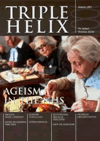A daughter is killed by her father, who receives a suspended sentence for manslaughter. One of the many issues raised by this sad episode is the adequacy of care provided by the mental health services.
What are the 'facts' of this case, in so much as we know them from the media? Sarah Lawson (centre photo), 22, was admitted to Homefield Hospital, Worthing, on 20 April 2000. She was discharged the following day and died in the early hours of the next morning. Her father had 'helped his daughter take a drugs overdose and held a pillow and plastic bag over her head until she suffocated'. [1]
What was the young woman suffering with and what do we make of the care offered by mental health services? According to one source [2] she left school prematurely, became anorexic and was drinking half a bottle of vodka each morning. At 16, she was put on Prozac and then given electro-convulsive treatment. She was under continuous psychiatric treatment at Worthing. She was diagnosed as having a personality disorder characterised by repeated episodes of self-harm. The psychiatrists referred her to two specialist out-of-district centres for treating such patients, including the Cassel Hospital in London. However, Sarah did not accept a place there. Eventually, she disengaged from Worthing psychiatric services in October 1999. She then re-presented [3] to Accident and Emergency six months later, having cut her wrists. She was re-admitted to Homefield as a voluntary patient, despite her GP's request for her to be detained under the Mental Health Act. She was given a new care plan and re-referred to the Cassel. She was discharged the following day and died shortly after.
Sarah's mother [4] and her GP [5] stated that she was let down by services. However, patients such as Sarah pose a considerable challenge to the NHS. It is uncommon to detain them under the Mental Health Act. Firstly, the acute symptoms usually resolve in a few hours or days and secondly, there is rarely a treatment that has been shown to be effective on a compulsory basis. Therefore it is customary to offer brief admissions to general psychiatric wards when patients with personality disorder present with suicidal thoughts or self-harm. There is evidence that longer term inpatient treatment in a therapeutic community, such as that offered by the Cassel, is effective [6,7,8] and that some group and individual outpatient psychotherapies are helpful. It is important to state that these are offered on a voluntary basis.
The patient's GP states that she was 'let down by the mental health team because she was discharged for a relatively trivial offence'. [9] However, she was caught handing cannabis to a severely mentally ill patient. Psychiatric wards need to set certain regulations; otherwise the job becomes even more difficult.
Because of the persistent nature of ingrained behaviour patterns, the treatment of patients with personality disorder is complex and difficult. It appears that in this case, the psychiatric services did offer many treatment options and the tragic outcome of this case was not due to lack of services. This seems to be confirmed by a well known psychiatrist who has discussed the case in the media. [10]
What can we say about the father's part in this tragedy? Legally, he was judged to have been wrong to act as he did. Any precedent that might have been set by not imprisoning him for murder has, to a large extent, been averted by a guilty verdict. The judge recognised the severe degree of suffering experienced by both Sarah and her father, so gave a suspended sentence for the lesser offence of manslaughter. In English law, there is a separate offence of aiding and abetting suicide. By not charging him with this, the legal authorities appear to be attaching a higher degree of gravity to the offence.
Ethically, the case inevitably raises the issue of euthanasia. There have been other cases of people assisting in the death of relatives. Usually, the latter have been suffering from incurable physical illness. The same principle is pertinent to the Christian objection to the practice of euthanasia for both physical and psychiatric conditions. [11] It is derived from the biblical view that it is God's prerogative to give and to take away a person's life.
Alongside the Christian principles of justice and truth, however, are those of hope and mercy. The Christian mental health professional will want to offer hope to patients and their carers. This hope may be medical in emphasis or psychological, social or spiritual. To give up hope may lead to despair both on the part of sufferers and their carers, and may open the floodgates to acts of desperation by relatives, as seems to have happened in this case.
































